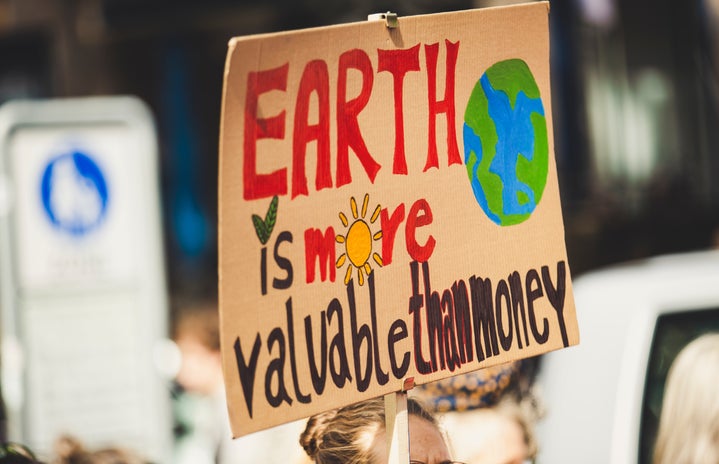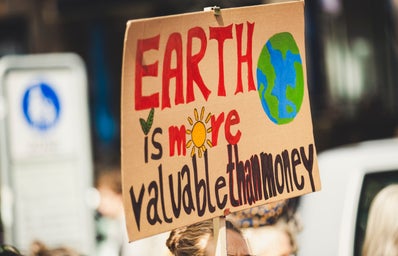The end-of-world scenario depicted in one of Netflix’s recent top films, “Don’t Look Up,” grimly reminded me of a question I ponder day in and day out: How are we actually going to help solve the growing climate crisis? Often, I feel as if my individual efforts towards sustainability, including everything from recycling to eating less meat, aren’t actually moving the needle.
Does the key to truly changing the world, then, lie with influential figures who have sparked movements and continue to remind us of the Earth’s value? The names Greta Thunberg, Dr. Jane Goodall and even Leonardo DiCaprio come to mind.
By now, I’m sure many have watched or at least heard about “Don’t Look Up.” While the movie has received mixed reviews, dividing critics and viewers, it has had success among one group in particular: the film’s allegorical heroes, aka (climate) scientists and activists.
“I’ve never felt so seen as watching @LeoDiCaprio & Jennifer Lawrence play scientists warning of pending apocalypse in #DontLookUp. I was wincing, anxious, nervous sweating, and nearly shouted at the screen ‘Are you fucking kidding me?! Listen to the scientists!,’” tweeted Dr. Ayana Elizabeth Johnson, a notable marine biologist, policy expert, conservation strategist, and writer, among other things.
The film is a satire in which two scientists attempt to warn an indifferent world about a comet that threatens to destroy the planet. It’s an intentional allegory of the climate crisis and a powerful portrayal of society’s response (or lack thereof) to scientific warnings.
As an environmentalist myself, I could understand the way the film articulated a very frustrating sense among scientists and activists of having their messages fall on deaf ears. For decades, climate scientists and activists around the world — who truly understand the gravity, seriousness, and urgency of the climate crisis — have had to deal with governments that degrade, ignore, and dismiss the warnings of science and, in turn, people going about their daily lives like everything’s normal.
But despite how many saw the movie as a failure, the fact that it has broken a Netflix viewing record shows that maybe films — especially those drawing on the power of popular or influential figures and even humor — could be the much-needed tactic to prompt climate conversations in an effort to make sense of and find solutions for a crisis in which many feel lost.
That’s where Leonardo DiCaprio comes in. DiCaprio is the film’s star scientist and an avid climate advocate in real life. DiCaprio, some could argue, has been doing more for the environment for decades than some of our governments and politicians. So has DiCaprio, one highly influential figure on and off the movie screen, helped move the needle? Maybe?
Let’s take a look at just a few ways — through his films, activism, and investments — that Leonardo DiCaprio is helping save the planet.
1. He uses the power of film to educate and encourage action
Ever heard of “Cowspiracy,” an eye-opening documentary from 2014 that explores the impact of animal agriculture on the environment? How about “Before the Flood,” a National Geographic film featuring DiCaprio, as a United Nations Messenger of Peace, traveling around the world to witness climate change firsthand? What about “The Loneliest Whale,” “Virunga,” “And We Go Green” or “Sea of Shadows”? All are environmental or animal welfare films/documentaries that DiCaprio has been involved in.
2. The Leonardo DiCaprio Foundation (est. 1998)
At just 24 years old, DiCaprio established his foundation to support various innovative and collaborative projects worldwide aimed at protecting fragile ecosystems and communities, safeguarding vulnerable wildlife, and building climate resiliency. According to the website, LDF brings attention and funding to six focus areas: Wildlands Conservation, Oceans Conservation, Climate Change, Indigenous Rights, Transforming California and Innovative Solutions.
3. His leadership in environmental protection organizations
DiCaprio serves on the board of several environmental organizations, including the World Wildlife Fund, Natural Resources Defense Council, National Geographic’s Pristine Seas, Oceans 5, and the International Fund for Animal Welfare. Recently, he helped co-found Re:wild, an initiative to “rewild the world” by protecting and restoring the diversity of life on Earth.
4. His recognition as a United Nations Messenger of Peace
DiCaprio was named a United Nations Messenger of Peace with a special focus on climate change in 2014. During his acceptance speech, he said, “I feel a moral obligation to speak out at this key moment in human history—it is a moment for action. How we respond to the climate crisis in the coming years will likely determine the fate of humanity and our planet.”
5. He advocates for plant-based eating and invests in vegan businesses
DiCaprio has taken to social media numerous times to urge people to reduce their beef consumption, and even replace meat with plant-based burgers, as one small step to help reduce climate change. Alongside his investments in various earth-saving charities and nonprofit organizations, DiCaprio has also largely invested in many vegan companies: plant-based milk manufacturer Califia Farms, vegan meat brand Beyond Meat, vegan snack maker Hippeas, and many more.
6. He’s not afraid to use his platform to discuss big issues
DiCaprio used his 2016 Oscars acceptance speech for his role in The Revenant as an opportunity to raise awareness of the climate crisis. “Climate change is real, it is happening now. It is the most urgent threat to our entire species,” DiCaprio said. Alongside his impassioned speeches on national television and at the United Nations, DiCaprio also regularly uses his social media accounts — with millions of followers — to regularly discuss a myriad of issues, from climate change to renewable energy to wildlife protection.
7. He’s a huge proponent of conservation and animal welfare
For years, LDF has donated millions of dollars to various conservation projects aimed at protecting endangered species and has been instrumental in ending the inhumane ivory trade in Thailand. DiCaprio also co-founded the nonprofit Earth Alliance in 2019 to protect wildlife threatened by climate change and loss of biodiversity. Shortly after its launch, Earth Alliance made an initial pledge of $5 million, distributed directly to local partners and the indigenous communities protecting the Amazon, to help fight the fires devastating the Amazon rainforest.
8. He’s a humanitarian at heart
The LDF has been dedicated to protecting the rights of Indigenous communities. For example, LDF has partnered with Amazon Frontlines to support Indigenous people in the Amazon in protecting and defending their lands and culture.
9. He supports smart solutions
Just like his investment in vegan meat brand Beyond Meat, DiCaprio has supported another smart solution to another big polluter: fossil fuels. DiCaprio is on the Board of Advisors for Kingo, a solar company that provides clean power to people in remote places around the globe.
So, does the key to truly changing the world lie with influential figures like Leo?
I think yes and no. While the Earth is still in grave danger, his ventures — alongside the work of numerous other influential environmentalists, scientists, and activists — have raised much-needed awareness and funding for dire environmental issues. His efforts, however, have also shown people like me that our individual actions and activism are just as important in the overall problem-solving process. It takes more than one person, one leader, or one influencer to save the world … it’s a collaborative effort. “Don’t Look Up” is a startling reminder that everyone (yes, everyone!) can take steps to protect our home all the while supporting those — like DiCaprio, Thunberg, or Goodall — that have built large, influential platforms aimed at saving life on Earth.


